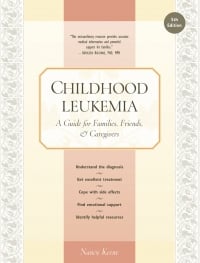Childhood Leukemia
Dietitian/Nutritionist
It can be very helpful to consult with the hospital dietician/nutritionist to get more information and ideas about how to add more protein, calories, and vitamins/minerals to your child’s diet. You can also consult with a private registered dietitian nutritionist (RDN) who has experience helping children with cancer. The Academy of Nutrition and Dietetics (www.eatright.org) is the country’s largest group representing registered nutrition professionals; you can search for an RDN in your area on its website.
My 14-year-old daughter, Gabby, made it through transplant with no supplemental feedings. Before the transplant, she loaded up on healthy food; then when the mucositis hit, we worked with the dieticians and focused on what she could eat. She was also helped by appetite stimulants like Marinol®. I kept the fridge stocked with anything she was craving so when she was willing to eat, she didn’t have to wait. I also created a goal chart that listed daily activities like taking the mouth sore medicine that tasted terrible, eating snacks, going for a walk, etc. She felt empowered when she checked off these activities every day. When she had done all of the tasks for a week, she got a big stuffed turtle from the gift shop that she really wanted. She was inpatient for less than three weeks.
Six-year-old Flynn is in maintenance for ALL. We participated in a nutrition research project for kids that was a great relief. I had become depressed in the kitchen as the ALL ruined our family meal times. Flynn developed issues around food; he had a fear of new foods and every meal time was a sad battle. But thanks to an intervention at the hospital, all that has since changed. Flynn eats a wide variety of foods, is less afraid to try new foods, eats fresh vegetables, and our meal times are back to normal. I’m so grateful for every meal we eat together as a family.
Table of Contents
All Guides- Introduction
- 1. Diagnosis
- 2. Overview of Childhood Leukemia
- 3. Acute Lymphoblastic Leukemia
- 4. Acute Myeloid Leukemia
- 5. Juvenile Myelomonocytic Leukemia
- 6. Chronic Myelogenous Leukemia
- 7. Telling Your Child and Others
- 8. Choosing a Treatment
- 9. Coping with Procedures
- 10. Forming a Partnership with the Medical Team
- 11. Hospitalization
- 12. Central Venous Catheters
- 13. Chemotherapy and Other Medications
- 14. Common Side Effects of Treatment
- 15. Radiation Therapy
- 16. Stem Cell Transplantation
- 17. Siblings
- 18. Family and Friends
- 19. Communication and Behavior
- 20. School
- 21. Sources of Support
- 22. Nutrition
- 23. Insurance, Record-keeping, and Financial Assistance
- 24. End of Treatment and Beyond
- 25. Relapse
- 26. Death and Bereavement
- Appendix A. Blood Tests and What They Mean
- Appendix B. Resource Organizations
- Appendix C. Books, Websites, and Support Groups

